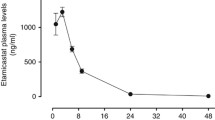Summary
Twenty patients (mean age 49±4 (SEM) yr) with mild to moderate essential hypertension were studied during placebo conditions, following 6 weeks of chlorthalidone monotherapy and 6 to 28 weeks of combined beta-blocker-chlorthalidone treatment, or vice versa. Compared to chlorthalidone therapy alone, addition of a beta-blocker to this diuretic caused a further blood pressure reduction in 11 patients (Responders); in 9 patients addition of a beta-blocking agent failed to further reduce blood pressure (Non-responders). Supine and upright plasma renin, aldosterone, norepinephrine and epinephrine levels and catecholamine excretion rates were always comparable between Responders and Non-responders. In both groups plasma and urinary norepinephrine or epinephrine values were not significantly altered following addition of a beta-blocker; heart rate and plasma renin activity were decreased in both groups to a similar extent. It is concluded that the antihypertensive mechanism of beta-blockers given to diuretic treated patients with essential hypertension is independant of renin and not associated with changes in plasma or urinary catecholamines.
Zusammenfassung
20 Patienten (mittleres Alter 49±3 (SEM) Jahre) mit leichter bis mittelschwerer essentieller Hypertonie wurden nach einer 4wöchigen Placebophase, 6 Wochen Chlorthalidon-Monotherapie, sowie nach 6 bis 28 Wochen Kombinationstherapie mit Chlorthalidon und einem Betablocker oder in umgekehrter Reihenfolge untersucht. Verglichen mit Chlorthalidon-Monotherapie führte die Zugabe eines Betablockers zum Diuretikum bei 11 Patienten zu einer weiteren Blutdrucksenkung (Responder-Gruppe); bei 9 Patienten führte die Zugabe eines Betablockers zu keiner zusätzlichen Blutdrucksenkung (Non-responder-Gruppe). Die im Liegen und Stehen gemessenen Blutspiegel von Renin, Aldosteron, Noradrenalin und Adrenalin sowie die Katecholamin-Ausscheidung im Urin unterschieden sich in keiner Studien-Phase zwischen Responder- und Non-responder-Gruppe. In beiden Gruppen wurden die Plasmaoder Urin-Katecholaminspiegel durch die Zugabe eines Betablockers nicht signifikant verändert, während die Plasmareninaktivität und die Pulsfrequenz dadurch gleichermaßen erniedrigt wurden. Unsere Befunde weisen darauf hin, daß die blutdrucksenkende Wirkung von Betablockern bei Diuretika-behandelten Patienten Renin-unabhängig ist und auch nicht mit Veränderungen der Plasma- oder Urinkatecholamine einhergeht.
Similar content being viewed by others
References
Prichard BNC (1978) Beta-adrenergic receptor blockade in hypertension, past, present and future. Br J Clin Pharmacol 5:379–399
Lewis P (1976) The essential action of propranolol in hypertension. Am J Med 60:837–852
Irving MH, Britton BJ, Wood WG, Padgham C, Carruthers M (1974) Effects of beta-adrenergic blockade on plasma catecholamines in exercise. Nature 284:531–533
Distler A, Keim HJ, Cordes U, Philipp T, Wolff HP (1978) Sympathetic responsiveness and antihypertensive effect of beta-receptor blockade in essential hypertension. Am J Med 64:446–451
Franco-Morselli R, Baudouin-Legros M, Meyer P (1978) Plasma adrenaline and noradrenaline in essential hypertension and after long-term treatment with beta-adrenoreceptor-blocking agents. Clin Sci Mol Med 55:97s-100s
Lijnen PJ, Amery AK, Fagard RH, Reybrouck TM, Moerman EJ, De Schaepdryver AF (1979) The effects of beta-adrenoceptor blockade on renin, angiotensin, aldosterone and catecholamines at rest and during exercise. Br J Clin Pharmacol 7:175–181
Brecht HM, Bantien F, Schoeppe W (1976) Decrease in plasma noradrenaline following long-term treatment with pindolol in patients with essential hypertension. Klin Wochenschr 54:1095–1105
Mueller HS, Ayres SM (1980) Propranolol decreases sympathetic nervous activity reflected by plasma catecholamines during evolution of myocardial infarction in man. J Clin Invest 65:338–346
Bravo EL, Tarazi RC, Dustan HP (1975) Beta-adrenergic blockade in diuretic-treated patients with essential hypertension. N Engl J Med 292:66–70
Weidmann P, Beretta-Piccoli C, Ziegler WH, Keusch G, Glück Z, Reubi FC (1978) Age versus urinary sodium for judging renin, aldosterone, and catecholamine levels: studies in normal subjects and patients with essential hypertension. Kidney Int 14:619–628
Bertler A, Carlsson A, Rosengren E (1958) A method for the fluorometric determination of adrenaline and noradrenaline in tissues. Acta Physiol Scand 44:273–292
Weidmann P, Hirsch D, Beretta-Piccoli C, Reubi FC, Ziegler WH (1977) Interrelations among blood pressure, blood volume, plasma renin activity, and urinary catecholamines in benign essential hypertension. Am J Med 62:209–218
Veall N, Vetter H (1958) Radioisotope techniques in clinical research and diagnosis. Butterworth, London
Sealey JE, Gerten-Banes J, Laragh JH (1972) The renin system: variations in man measured by radioimmunoassay or bioassay. Kidney Int 1:240–253
Vetter W, Vetter H, Siegenthaler W (1973) Radioimmunoassay for aldosterone without chromatography: II. Determination of plasma aldosterone. Acta Endocrinol (Copenh) 74:558–567
Da Prada M, Zürcher G (1976) Simultaneous radioenzymatic determination of plasma and tissue adrenaline, noradrenaline and dopamine within the femtomole range. Life Sci 19:1161–1174
Author information
Authors and Affiliations
Additional information
Supported in part by the Swiss National Science Foundation
Rights and permissions
About this article
Cite this article
Meier, A., Weidmann, P. & Ziegler, W.H. Responses of catecholamines and blood pressure to beta-blockade in diuretic-treated patients with essential hypertension. Klin Wochenschr 60, 27–32 (1982). https://doi.org/10.1007/BF01721584
Received:
Accepted:
Issue Date:
DOI: https://doi.org/10.1007/BF01721584




